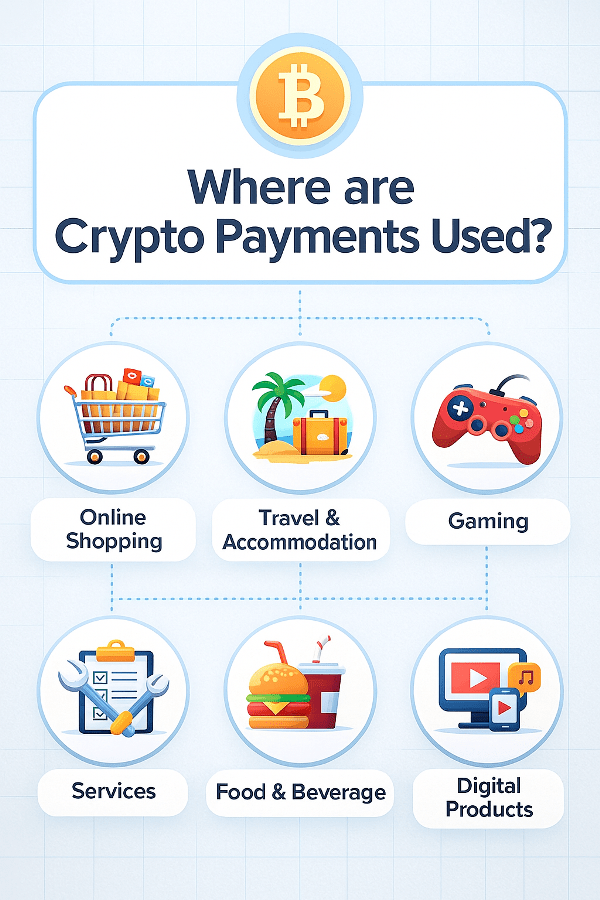5 Areas Where Crypto Payments Are Used14 min read
Reading Time: 6 minutesToday, we’ll look at the areas where crypto payments are used. We’ll provide you with information on this topic. Details are in our article.
In recent years, crypto payments have grown in popularity as more businesses and individuals adopt digital currencies like Bitcoin and Ethereum.
While still relatively niche compared to traditional payment methods, crypto payments are being used increasingly in several key areas. Let’s explore the top 5 sectors where crypto payments are currently gaining the most traction.
Where are Crypto Payments Used?
Crypto payments are appearing in more and more places as mainstream adoption grows. Here are 5 sectors where cryptocurrencies like Bitcoin are commonly used to facilitate online transactions.

Industries Where Crypto Payments Are Used
1 – Online Shopping and Retail
Some major online retailers have started accepting crypto payments directly on their websites. This gives customers a new convenient way to purchase goods and services digitally.
For Example ↵ Big names like Microsoft, Expedia, and Newegg were early adopters of crypto payments. Now thousands of smaller online merchants have also added the option.
For consumers, crypto payments offer an alternative to credit cards that provides additional privacy and control over funds. There’s no centralized company that can block or reverse transactions.
Retailers benefit from access to the large crypto user base and potential for higher sales volumes and average order values from tech-savvy customers.
2 – Travel and Hospitality
The tourism industry has been quick to embrace crypto payments as a way to attract new clientele.
Several major airlines like AirBaltic allow passengers to book flights using digital currencies. Hotel chains like Choice Hotels and Expedia subsidiary Vrbo accept crypto for room reservations as well.
For travelers, crypto payments remove the fees associated with currency conversion and international money transfers. People can lock in exchange rates upfront rather than dealing with fluxuations.
Hotels and resorts gain visibility with an affluent demographic interested in new payment rails. Accepting crypto signals that a business is innovative and tech-forward.
3 – Food and Entertainment
Consumer-facing sectors like restaurants, tickets, and streaming have been some of the earliest commercial adopters of crypto payments.
Major chains like Starbucks, Subway, and Home Depot started piloting crypto options in late 2020. AMC Theaters famously began accepting Bitcoin payments for movie tickets last year.
More underground use cases have also emerged, whether at private clubs, shows, or online adult sites catering to privacy-conscious customers.
The unbanked population too has found new ways to spend digital funds or cash out earnings from the growing gig economy. Acceptance is widening the use cases and real-world spending of various cryptocurrencies on an everyday basis.
4 – Financial Services
As the underlying technology behind many cryptos, the blockchain has major implications for banking and finance. From crypto trading and lending platforms to automated market makers, many new decentralized finance or “DeFi” applications have proliferated in recent years.
Meanwhile, traditional financial institutions are also getting in on the action. Numerous brokerages now allow clients to buy, sell and hold digital assets.
Some offer crypto payment options and rewards programs too. A growing number of regional and national banks even provide core custodial services for large institutional crypto investors.
5 – B2B Payments
While retail crypto payments have garnered most headlines, business-to-business digital currency transactions are quietly becoming more widespread.
Cross-border settlements that once took weeks can now be completed in under an hour using the blockchain. This appeals to global corporations managing intricate supply chains.
Bitcoins and altcoins also offer a censorship-resistant way for small businesses to receive funds internationally while avoiding capital controls or predatory exchange rates.
As crypto payments evolve, they are enhancing transparency and efficiencies in both B2C and B2B commerce on a global scale.

Which Bank Accounts Can Use Crypto Payments?
As the adoption of crypto payments accelerates, more digital banking providers are stepping up to serve this growing market segment.
Pioneering financial institutions like The Kingdom Bank have led the way in offering specialized crypto accounts to complement their existing personal and business banking services.
The Kingdom Bank’s crypto banking division offers both retail and commercial clients a regulated platform to leverage digital currencies for myriad payment and investment use cases.
All crypto transactions are processed securely through regulated channels and stored using best-in-class custody solutions.
Ouick Note ↵ With a The Kingdom Bank crypto account, eligible account holders can make purchases from merchants accepting select cryptocurrencies directly from their online profile. Funds are instantly debited while the merchant receives the equivalent fiat currency amount minus nominal processing fees.
Both personal and corporate bank accounts at The Kingdom Bank have the unique ability to directly utilize various crypto payment networks without needing external exchanges or wallets.
This integrated approach provides a convenient and compliant one-stop banking experience for both private and commercial crypto users.
Can Corporate Bank Accounts Make Crypto Payments?
For businesses, The Kingdom Bank provides specialized corporate bank accounts catering to the complex needs of commercial clients engaged in crypto activities. Key features include multi-user access, customizable internal workflows, and robust integration with mainstream accounting packages.
With a business crypto account from The Kingdom Bank, corporations gain the ability to easily receive crypto invoice payments from customers, partners or marketplaces around the world.
Funds are immediately deposited in the customer’s chosen fiat currency such as USD or EUR to enhance budget clarity.
On the payout side, companies can use their corporate bank account to reward international affiliates, freelancers or suppliers with near-instant crypto settlements. This allows businesses to expand global operations while bypassing costly cross-border payment railways.
Short Reminder ↵ Advanced crypto treasury services are also accessible to qualified commercial clients of The Kingdom Bank. Options exist to collateralize loans with Bitcoin or Ether holdings, launch payroll programs in crypto, and more – all within regulated banking frameworks.
How to Grow in Digital Banking with Crypto Payments?
As adoption spreads, innovative financial institutions are actively cultivating new opportunities presented by the rising digital economy and its currencies.
For example, The Kingdom Bank aims to spearhead controlled innovation in the industry through approaches like:
Offering flexible APIs so clients can build bespoke crypto-centric financial applications and services. This empowers merchants and developers to better serve their crypto-using customer communities through tailored integration of banking services.
Partnering with global crypto exchanges to offer trading and custodial services directly within an insured, regulated banking environment.
This seamless one-stop offering simplifies the lives of active digital currency traders and investors managing sizable portfolios.
Maintaining an open dialogue with digital currency projects and researching promising protocols poised to disrupt legacy systems.
The bank is strategically positioned to support the next wave of growth in decentralized finance through selective early-stage involvement where compliance allows.
Regularly expanding the number of supported cryptocurrencies based on demonstrated market demand. Keeping pace with innovation in this fast moving landscape helps retain existing clients and draw in new ones engaged with an expanding universe of blockchain technologies.

Making International Payments with Crypto Payments
One area where the advantages of crypto settlement really shine is cross-border money transfers. Whether initiating payments between national subsidiaries, paying global freelancers or suppliers, or facilitating international eCommerce – traditional wire networks are ill-equipped for the digital age.
Using specialized tools from banking partners proficient in crypto payments completely alleviates these frictions.
For example, the corporate treasury department of an online marketplace can initiate settlement of bi-weekly payrolls to remote workers in dozens of countries from a single The Kingdom Bank dashboard.
Rather than juggle myriad local bank partners and complex international payment instructions, funds are automatically distributed Peer-to-Peer across the crypto network.
Recipients receive deposits in-full within minutes regardless of location thanks to the accelerated blockchain.
Similarly, a manufacturing firm leveraging an overseas supply chain can rely on rail-like crypto tracking to ensure vendors receive scheduled funding on time, every time with confirmed self-sovereign transactions. All without dependence on fallible and costly correspondent banking relationships.
Compliant institutions like The Kingdom Bank ensure such activities occur respectfully under global regulation.
Yet they also recognize crypto’s potential to streamline wholesale capital flows in a fair, green and inclusive manner benefiting all parties. As this transition revitalizes globalization for the digital century, crypto payments will remain an integral driver.
The rapid proliferation of crypto payments signals profound shifts taking place in both local commerce and global finance.
Visionary banking innovators like The Kingdom Bank are empowering this movement by delivering specialized solutions that future proof banking itself for decentralized systems. Our integrated crypto services continue removing barriers between traditional banking and next-gen digital currencies worldwide.
About The Author





